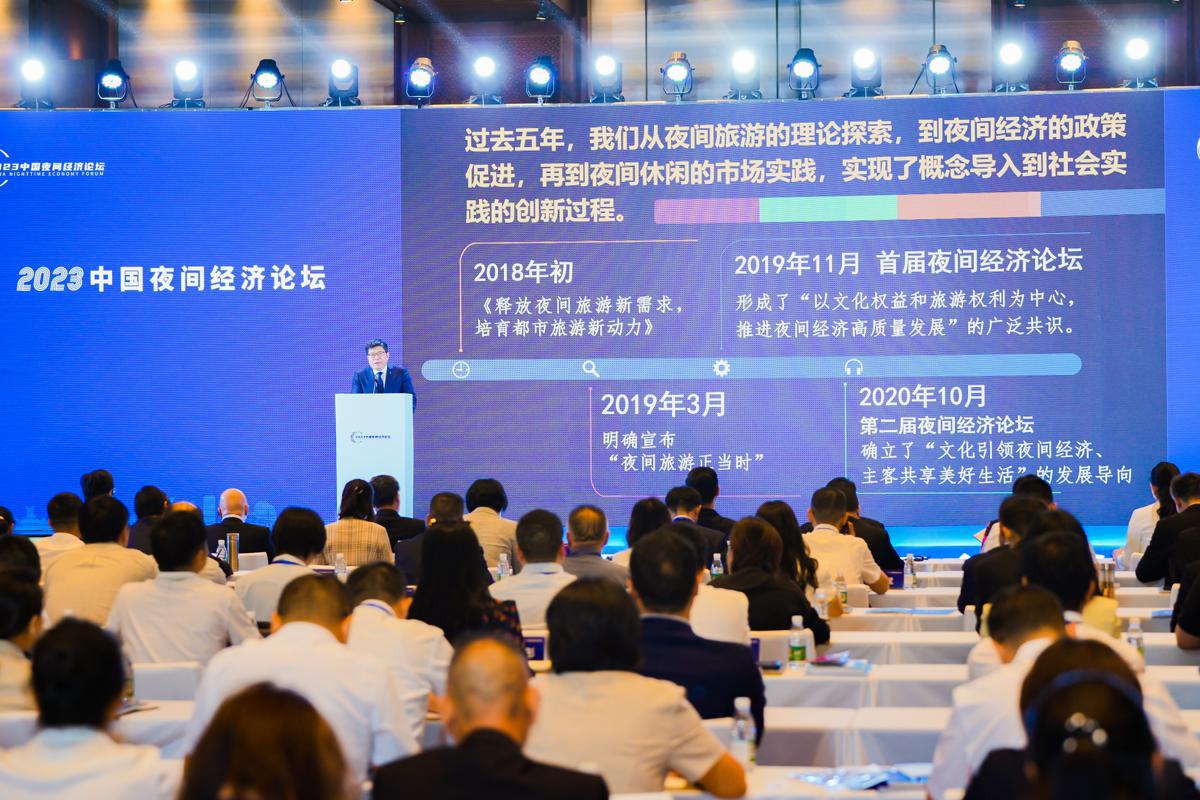
Dai Bin, president of the China Tourism Academy, speaks at the 2023 China Nighttime Economic Forum held in Sanya, Hainan province on Oct 11. [Photo provided to chinadaily.com.cn]
The nighttime economy entered the stage of accelerated development in spring and summer this year, said Dai Bin, president of China Tourism Academy, at the 2023 China Nighttime Economic Forum held in Sanya, Hainan province on Wednesday.
For a long time, nighttime activities had little demand, and so it often wasn't included in the scope of tourism. "Whether it was to participate in organized tour groups or budget travel, the vast majority of tourists were touring in the daytime and going to sleep in the evening. There were few options for night travel and leisure, either in terms of products and services for group travelers or public spaces for DIY travelers," Dai said in a speech.
But with the process of urbanization and economic and social development, the psychological perception of tourists and citizens about day and night has undergone big changes, and the needs of cultural leisure and tourism consumption at night have awakened.
Now 6pm to 10pm is known as the "golden four hours" of the night economy, according to Dai. Tourism and leisure spaces have expanded, and entertainment consumption has increased. In addition to KTV (dedicated karaoke rooms), dining and shopping, there are new entertainment activities such as immersive performing arts, scripted shows, light and shadow shows, music festivals, live houses, and hanfu (traditional Chinese clothing) parades.
The blocks, commercial areas and cultural venues within six kilometers of apartments, hotels and homestays are often considered the center of the nighttime economy.
China has set up 243 national gathering areas for nighttime cultural and tourist consumption, which "provide vivid scenes for tourists and citizens to feel the city atmosphere, better enjoy life at night, and even take city walk," Dai remarked.
In addition, the development of nighttime economy in key towns and tourism villages, such as Hongcun Village, Anhui province and Nianhua Bay in Lingshan Town, Jiangsu province, "help narrow the gap between cities and towns, so that more young people in small towns can feel and experience modern civilization at their doorways," Dai said.
He noted that nighttime tourism promotes both economic growth and social development.
After COVID-19, China's tourism industry moved forward from recovery to a new stage of economic growth. It's important to find new driving forces and explore new paths for tourist destinations.
"Sanya is one of the most well-known coastal tourism cities in China. Its seaside tourism activities are often carried out during the daytime, but we need to come up with ways to extend the travel time and enrich its formats; therefore we can have momentum for building Hainan into an international tourism consumption center," Dai said.
"If Sanya successfully explores such a path, it will become an example for coastal cities across China," he added.
Dai believes that under the construction of its free trade port, more international tourists will come to Hainan in the future, and it is essential to learn from the nighttime culture and tourism experience of other countries, and show the advantages of China's nighttime economy to the world.
Albert Yip, director-general of Sanya Tourism Promotion, said, "the China Nighttime Economic Forum is a representative, influential and professional forum, which can provide guidance for the future development of Sanya's nighttime economy."
"Sanya will explore the development of nighttime economic formats and offer tourists and citizens new nighttime entertainment," he said.
Lan Kwai Fong, Hong Kong's leading entertainment destination, is looking to expand business on the water in Sanya, said Allan Zeman, chairman of the Lan Kwai Fong Group. He suggested that by holding conventions and sports events, and developing its film industry, Sanya will have new attractions that will draw more tourists.














